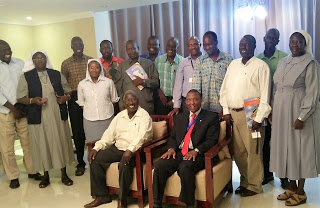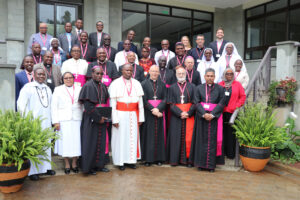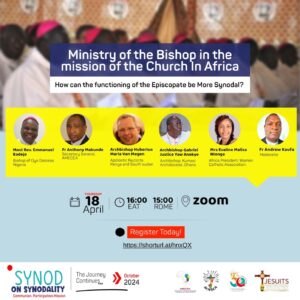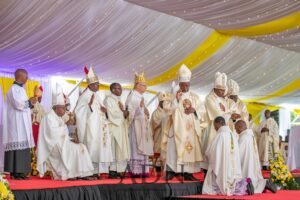SOUTH SUDAN: AMECEA Justice Peace and Caritas Department Conducts Training in South Sudan

Group Photo of the Participants of AMECEA Justice Peace and Caritas Training on Emergency Response in Conflict Held in Juba South Sudan
By Antony Mbandi, Coordinator AMECEA Justice Peace and Caritas Department
The AMECEA Justice Peace and Caritas department with the support of United States Conference of Catholic Bishops, has just concluded yet another successful training on emergency response in conflict scenario for church agents. The two (2) day training took place in Juba, South Sudan, with the focus being how the local affects the development of rapid, effective and efficient humanitarian response especially where there is conflict. The training, which was targeted at church agents included priests, religious nuns and laity working with catholic justice and peace commissions at various levels. There was also representation from the caritas, health and social communications departments of the South Sudan Bishops Secretariat. The sessions started with an overview of who AMECEA is and also the reasoning behind ensuring the capacity of church agents in the AMECEA region is fit-for-purpose.

and Caritas Training on Emergency Response in Conflict
Held in Juba South Sudan
In the training a lot of issues surrounding the South Sudanese conflict were discussed. Critical issues that were raised include the lack of proper education system, which looks beyond academic work but also knowledge transfer on the value of a nation. This theme was raised consistently and resonated well with the need to seek consensus in a conflict as we develop a humanitarian response.
Another issue that came up according to the clergy was the need to have the South-South Dialogue as was envisaged in the 2005 peace agreement. This according to discussions would unlock the current grid-lock in discussions and will bring on board the 64 tribes of South Sudan to the table to define their future.
The need for the regional and the international community not to give up on South Sudan was raised. Concerns from the participants indicated that the feeling of despair was creeping into the communities and for sure within the church agents with the never-ending conflict seeming to declare doom for the young nation. This was also mirrored in the discussions on emergency response especially when the level of need heavily outweighs the assistance available and in some cases where the assistance available is curtailed by violence or war. A good example is delivery of the mission appeal that was undertaken by Caritas South Sudan could be hampered by the current political climate though it received a good response from the Caritas family.
As was stated by one of the participants “Hunger is bullet number one”. The people of South Sudan have not been able to produce since the economic activities have been disrupted. With low productivity including agricultural, the pending catastrophe may not be fully appreciated by many who do not live in South Sudan. It was clear to the participants that advocacy, neutrality and reconciliation are elements that are key in ensuring that humanitarian response achieves any meaningful impact.
In conclusion, the participants were encouraged to remain steadfast to the mission of Christ. They were also reminded that the church remains a strong voice for the voiceless. The participants appreciated that the training had taken place especially in Juba as this showed solidarity of AMECEA with the people of South Sudan.
∽End∽


